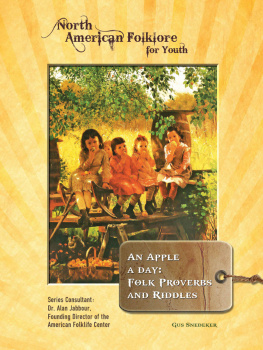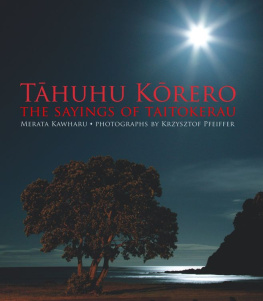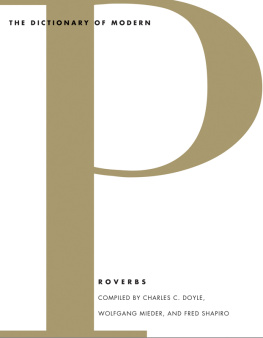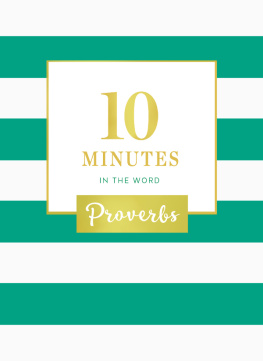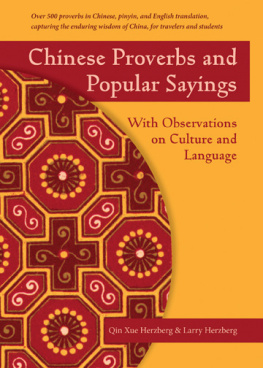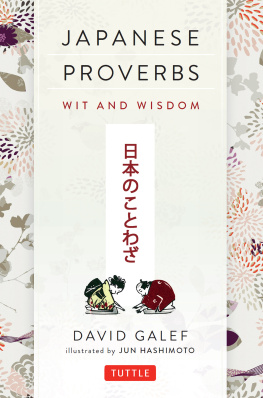French Folk Wisdom: Bilingual Edition Jay Burnett
Table of Contents
Folk Wisdom from France
O ur ancestors in pre-literate times were no more stupid than we are today. Just to survive required a great deal of astuteness. Wisdom often consisted in acute observation, and learning from ones own as well as others hard-won and often painful experience. The various peoples of Europe condensed these lessons in short pithy proverbs and sayings, an important part of their popular culture to this day. To the foreign reader, they offer an interesting glimpse of a culture and its values, although some of the sayings do exist in identical or similar form across various languages (often because they derive from a common Latin root.) Short as they are, the proverbs encapsulate centuries of experience and well-defined attitudes. It is interesting to try and guess at the (non-literal) figurative meanings, as in a puzzle.
Some are quite obscure, possibly because the cultural references no longer exist. These French proverbs differ from e.g. the German ones by more frequent reference to the Devil, and more clerical references (church, bell, procession, etc.) Overall they reflect a highly pragmatic and down-to-earth, even at times a cynical attitude towards life and society. Popular sayings and proverbs are notoriously difficult to translate. Some of the dramatic presentation and most of the wordplay inevitably gets lost. Nonetheless enough of the original sense survives to make proverbs an interesting read, ideal for those short intervals of your day when you dont have enough time to get immersed in some longer, convoluted narrative.
This EBook presents a selection of over 300 French popular phrases newly translated into English. I have aimed to keep the translations are as literal as possible, so as not to lose the authentic French flavour, but in some cases it was necessary to deviate from a narrow translation in the interest of style and intelligibility. How to read this book: These nuggets of ancient wisdom merit a moment of reflection or pondering before passing on to the next one. You can unpack the meaning of proverbs that interest you by considering in what context such a saying would first have arisen, and whether it conforms to your own observations and experience of human nature. If it was true five hundred years ago, is it still true today? Is the saying familiar from your own language, or is there something that expresses a similar idea in different words? Most importantly - does it have any practical application to your life here and now? You may well find that several of the proverbs in this collection offer a helpful perspective on some of your current problems and objectives. Enjoy!
Life in General
Le soleil ne chauffe que ce qu'il voit.
The sun warms only what it can see. On ne doit pas avoir d'un pch deux pnitences. One sin should not carry two penances. De deux regardeurs il y en a un qui devient joueur. Of every two kibitzers, one will turn into a player. Aujourd'hui moi, demain toi.
Today its my turn, tomorrow yours. L'eau va toujours la rivire. The water always flows to the river. Nulle montagne sans valle. There is no mountain without valley. Qui a honte de manger a honte de vivre.
Who is ashamed to eat, is ashamed of being alive. Tout nouveau, tout beau. Everything new is handsome. De la main la bouche se perd souvent la soupe. From hand to mouth the soup frequently gets lost. Le soleil brille pour tout le monde.
The sun shines for everyone. Nul n'a jamais pu se vanter d'avoir invent la vrit. Nobody has ever been able to claim that he invented the truth. Il faut laisser passer l'orage. You have to let the storm pass. Qui recherche la lune, ne voit pas les toiles.
Who is looking for the moon, wont see the stars. Il n'y a que les fous qui ne changent pas d'avis. Only fools never change their minds. Ce qui vient du diable retourne au diable. What comes from the devil will go back to the devil. Tout lasse, tout casse, tout passe.
Everything tires, everything gets broken, everything passes. L'cole de la vie n'a point de vacances. There are no vacations in the school of life. Il y a plus de paille que de grain. Theres a lot more straw than grain. Chacun sait o son soulier le blesse.
Everyone knows where his own shoe pinches. La vrit est comme l'huile: elle monte toujours la surface. Truth is like oil it always rises to the surface. Aux grands maux les grands remdes. Great evils require great remedies. L'homme heureux n'a pas de chemise.
The happy man has no shirt. Le temps est une lime qui travaille sans bruit. Time is like a file that works without noise. Qui vivra verra. He who lives, will see. L'an pass est toujours meilleur.
The year just past is always better. Qui aime l'arbre aime la branche. Who loves the tree, also loves the branch. La science est un puits dont l'homme est le seau. Science is a fountain, of which humans are the bucket.
Work and Business
Toute peine mrite salaire.
Every effort is worthy of a salary. Fou est le marchand qui dprise sa denre. Only a foolish vendor talks down his merchandise. Avec du temps et de la patience, on vient bout de tout. With time and patience, one can get to the bottom of anything. Chose acquise sue est plus chrie qu'hrite.
What you acquired by sweat and toil is more cherished than what you inherited. La semaine du travailleur a sept jours, la semaine du paresseux a sept demains. The workmans week has seven days, the lazy mans week has seven tomorrows. Pas pas, on va loin dans un jour. Step by step, one goes a long way in a single day. Mieux vaut acheter qu'emprunter.
Buying is better than borrowing. On ne saurait manier le beurre qu'on ne s'en graisse les doigts. One cannot handle butter without getting grease on ones fingers. Il n'y a point de plus sage abb que celui qui a t moine. The wisest abbot is the one who has been a monk. Il faut faire tourner le moulin lorsque le vent souffle.
The mill must be made to turn while the wind is blowing. De petite rivire de grands poissons n'espre. Dont expect to catch big fishes from small rivulets. Mieux vaut tre un mendiant qu'un ignorant. Even being a beggar is better than to be ignorant. Il ne faut pas laisser la proie pour l'ombre.
Dont let your prey get away as you catch at its shadow. On n'a rien sans mal. You dont achieve anything without pain. Qui ne fait rien, mange le foin, qui travaille, mange la paille. He who does nothing, eats the hay, while he who works, eats the straw. Ferveur de novice ne dure pas longtemps.
A novices fervour does not last long. Les grands diseurs ne sont pas les grands faiseurs. The biggest talkers are not the biggest doers. La persvrance vient bout de tout. To persistence, everything finally yields. Jamais homme ne gagne qui plaide son matre.
Nobody ever won by invoking the law against his master. Qui deux choses chasse, ni l'une ni l'autre ne prend. Who hunts after two objects, will not catch either the one or the other. Autant vaut celui qui chasse et rien ne prend comme celui qui lit et rien n'entend. A hunter who doesnt catch anything, is worth as little as a reader who reads without understanding. C'est en forgeant qu'on devient forgeron.
It is through beating the iron that you become a smith. Le valet du diable fait plus qu'on ne lui demande. The devils valet does more than one has asked of him. Ce n'est pas le tout de se lever matin, il faut encore arriver l'heure. Its not enough to get up in the morning: you also need to arrive on time. C'est pendant qu'il pleut qu'il faut remplir les jarres.
Its during the rain that you need to fill up your jars. Quand on est seul on devient ncessaire. When you are the only one, you become indispensable. L'indiffrence est le commencement de l'chec. Indifference is the beginning of failure. Travail bien rparti ne tue pas.
Next page

